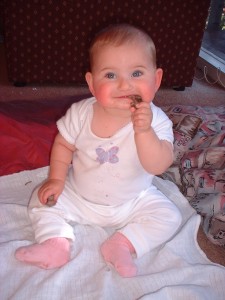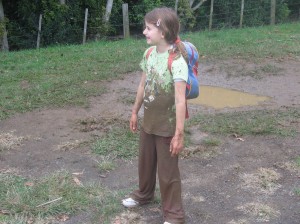A few days ago Cassia came bouncing up to me after getting dressed, wanting me to admire her skirt. She was also wearing trousers and two t-shirts which struck me as more attention-worthy but she was on a mission. She said, look mummy. Isn’t this a pretty skirt?
That set off my feminine-identity alarm so I said, ‘I think it’s your little Cassie face that’s pretty. It’s a nice skirt but it’s you that’s pretty’. Okay, still not scoring ten out of ten on the it’s-the-beauty-within-that-counts scale but I had to start somewhere. She was aghast. ‘No! Skirts are pretty! Say it’s a pretty skirt!’ I tried again but she would have none of it. It reminded me of a time a couple of years ago when she was probably only two. Her grandfather told her that she looked very pretty and she looked at him in surprise and said, ‘But I’m not wearing a dress!’
And then last winter Amy went to school every day without her jacket. She had chosen the jacket herself the previous year and I thought she liked it, but every single day, no matter how cold, she found some excuse not to wear it. When I’d nagged enough she finally came out with the real reason: it was a puffy jacket and she thought it made her look fat.
This is Amy here. She’s the one in the maroon sweatshirt. See how she’s turned sideways and nearly disappeared? And she would rather be cold all winter than look fat.
Kids surprise you sometimes but there was nothing that had prepared me for the shock of hearing my ten-year-old saying that she thought she looked fat. I know there’s a popular perception that girls are growing up too soon and going on diets in primary school and it’s the fault of advertising agencies and various pop-tarts who are fifteen going on thirty and the world’s going to hell in a hand-cart, but if that’s true it’s not something I’ve seen evidence of around here. There’s not much point in dressing up to hang out at the Te Awamutu Pak ‘n’ Save, which is about as sophisticated as it gets for these girls, so Amy and her friends don’t seem to be worried about clothes apart from generally wanting to look okay. I don’t see them concerned with particular brands or styles, they don’t appear to try and copy pop stars or actresses, they don’t wear make up and because the height of local fashion outlets is Postie Plus they really aren’t exposed to advertising aimed at their age group. Amy is about as protected as she can be and yet by the age of ten she was already actively – going without her jacket, going for runs up the road and talking about (although not denying herself) food that makes you fat – worrying about her weight.
If she was a bit on the chubby side I would understand, at least, where that came from and we would be able to talk about healthy weight for a growing child and look at our family habits to make sure a problem wasn’t going to develop in the future. But when you hear it from someone whose ribs you can more or less count it is very very scary.
I had thought we were doing okay with bringing our kids up to know that gender doesn’t matter when it comes to doing whatever you want. We encourage them all to climb trees, play in mud, bake, help with younger siblings and do well in all school subjects regardless. Josh discusses science and astronomy and programming and all his favourite things with Amy exactly as he does with Daniel. We have the whole range of toys and books here and they all play with and read whatever they like. But gender conditioning is so insidious that it’s crept into my girls’ heads anyway and my ten-year-old thought that being skinny was more important than being warm and my two-year-old thought that she couldn’t possibly be pretty if she wasn’t wearing a dress.
Now I have a degree in child psychology, for all the good it does me in my daily life. I knew long before I had kids that people praise little boys for being strong and brave and smart and assertive and little girls for being quiet and gentle and pretty and compliant. I knew that’s why men end up as CEOs and women end up doing the dishes. I knew that’s why girls get bulimia and teenage pregnancy and boys think that unconsciousness counts as consent. But I did it anyway, even when I thought I wasn’t, and so did everybody else.
Boys and girls are not the same. When Amy and Daniel were little they both spent hours playing with the Thomas the Tank Engine train set. Amy would gather all the trains together and they would have discussions and relate. Daniel would use one to derail all the others in the most destructive way possible. The toy pushchair was another favourite: Amy would gently tuck the doll in and take it for a walk, and Daniel would use it as a sort of battering ram to bulldoze block towers and walls and Amy’s games. At the beach one day I watched as they both spent ages gathering shells. Amy made hers into the floor plan of a house and created furniture and people, while Daniel lined his up on a piece of driftwood, got the biggest stick he could find, and went along and gleefully smashed them all. Not all boys would have done what Daniel did, and Daniel sometimes wouldn’t have either. Not all girls would have behaved like Amy, and sometimes she would do something different too. But there did seem to be some hard-wired differences from very early on. Cassia has this obsession with pink but I don’t believe that’s hard-wired, I think that’s because in her short life she’s learned to equate pink with the things she’s supposed to want to be dressed in or to play with. She knows that she’s a girl and to do a good job of that she needs to love pink. Along the same lines – how to be a girl – a neighbour told me that her daughters had been instructed by the teacher to accept all requests to dance at the school ball because ‘Saying no might hurt the boy’s feelings and you can’t do that’, which goes a long way to explaining that particular school’s former (and current for all I know) nickname, Preggy High.
Perhaps I should have been more vigilant. I’m complicit, in dressing my baby girls in girly clothes (although by no means always), in telling them they need to wear a pretty dress to a party, and in buying dolls houses and necklaces as presents (along with train sets and bikes). I just didn’t realise how difficult it would be to convince them that what they look like isn’t important – or, at least, isn’t anybody else’s business to judge – and that quiet compliance in their dealings with boys (when they’re thirty and allowed to date) isn’t a virtue. I thought letting them climb trees and get dirty would be enough but I’m pretty sure that helping them navigate safely through to their eventual positions as CEOs, and giving them the skills to ignore the judgements on their clothes/weight/parenting choices once they’re there, is far more complicated than that.





